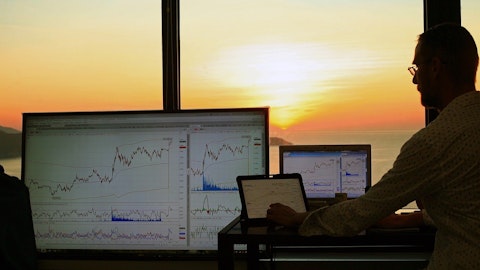And we recognize that as we move forward, we can continue to grow and strengthen that position while continuing to decarbonize our own assets and help our customers decarbonize their energy. So that core is very, very strong. But there’s 2 pieces that I have said, and I’ll continue to reiterate. Our focus is going to be on performance and discipline. Performance is going to be very much about how do we continue to drive operational excellence in our business? How do we focus on making sure that we are getting the consistency and the predictability in our overall results? And so that has all sorts of elements around how we think about working capital and the like. But also how do we continue to be lean and fit in what is an inflationary environment?
So those are all elements of the performance. And why do we focus on performance? Because I think there’s a lot more running room in the company. I know we’ve left money on the table in my previous business in Integrated Gas this year, so we can do better. And that’s the aim. We want to really drive that performance. And ultimately, to your question around distributions, if we can drive the performance to its full potential, we will have sufficient cash to be able to distribute even more to our shareholders. And that’s very much a core part of our focus. And when it comes to discipline, it’s about making sure we continue to be ruthless in our allocation of capital towards the value-enhancing opportunities we see there. And so you’ll hear a lot more of that.
I’ve given you a bit of a preview, and you’ll get a bit more of the details as we work them out over the coming few months. Chris, thank you for that question.
Operator: The next question is from Lydia Rainforth at Barclays.
Lydia Rainforth: Two questions, if I could. Firstly, Wael, on the exec committee changes, you’ve talked about making the business simpler and that pure interfaces mean greater cooperation, discipline and faith. What in practice are you changing about that capital allocation process? And what leaves it to be better effectively? And then just picking up on what you’re thinking about the operational performance and particularly in Integrated Gas, it does look like that’s been disappointing certainly relative to history. What can actually be done to improve that performance? And I’m not asking you to give too much, but just in terms of any kind of gap that you think is really there that we need to look at.
Wael Sawan: Yes, sure. I think on the first one, on the executive committee changes, I just mentioned to Chris’ question there, Lydia, the fact that performance and discipline were key going forward. And those were the 2 that also played in the decisions around the executive committee changes. And let me elaborate on that. And through that, maybe pick up on the operational performance question as well. The structure we are creating is one where we’re trying to minimize interfaces to be able to really allow the front line to deliver the value that’s needed with clear line of sight that the business directors have. In this case, our Upstream, Integrated Gas director as well as our Downstream and RES directors to have clear line of sight towards those business outcomes while the integration of our strategy as well as finance as well as M&A into one shop that will report into Sinead is meant to be able to allow us to ensure that strategy, capital allocation, the monitoring of performance to make sure that our capital is being allocated to where we see sustained strong performance, that loop has been sort of cut across 3 different parts of the organization comes together now.




